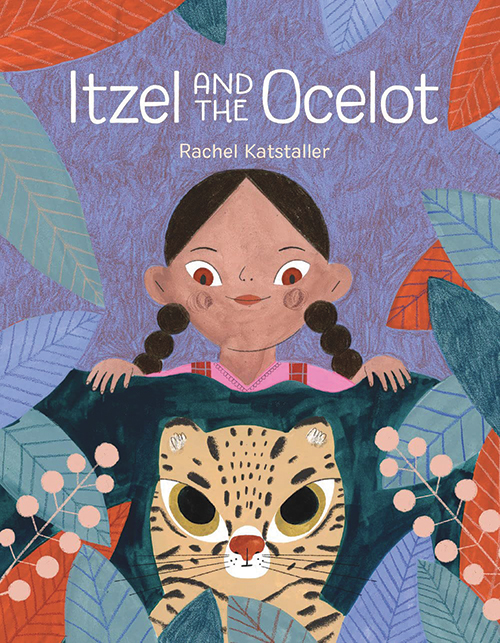
Itzel and the Ocelot
Reviewed by Jerry Mizell Williams
May 1, 2023
By Rachel Katstaller. Kids Can Press, 2022. 40 pages. $18.99/hardcover; $12.99/eBook. Recommended for ages 3–7.
To craft this culturally rich story of discovery and belonging, the author draws upon her childhood in El Salvador, where she heard Indigenous tales about the land and its creatures. Readers follow the adventures of young Itzel, who resides with her grandmother at the edge of a jungle. A year of extreme drought portends crop failure, famine, and curtailed income.
Itzel’s favorite story that her nana tells describes how when the earth was first formed, the lords of the hills would awaken a giant snake to make rain. Although the snake still resides in the place where water is born, disbelief in its presence and power has kept it sequestered. Itzel sets out on a nocturnal journey to find the snake. Stumbling into a pit, she plunges deep into the jungle where she meets an ocelot on the same mission. The ocelot emerges as Itzel’s tonal or protective spirit, and in response to Itzel’s surprise that he can talk, explains, “All animals can speak, but you humans never listen.”
Other native animals with whom she learns to communicate include an opossum, a teary-eyed agouti who seeks water for her tree in order to fashion its fruit into huacales or drinking vessels for the marketplace, and a kinkajou in need of water for her children. Additional sympathetic animals join the quest to find the snake. Through her courage and belief in ancestral legends, Itzel comes to realize that animals and humans are inseparable in that they share a precious environmental resource. Her story invites young readers to (re)imagine an intimate relationship with nature, God’s bounty, and what can be achieved when we work in harmony.
This symbolic tale embraces our Quaker concept of joy, and its magical literary influences are evocative of Alice in Wonderland, The Wizard of Oz, and other similar works. A glossary of words from Spanish and the nearly extinct Central American language Nawat, along with the explanatory author’s note, make this chromatically nuanced story practical as an environmental teaching tool.
Jerry Mizell Williams is a member of Green Street Meeting in Philadelphia, Pa. He has written books, articles, and book reviews on colonial Latin America.



Comments on Friendsjournal.org may be used in the Forum of the print magazine and may be edited for length and clarity.